Tanzania is located east of Africa’s Great Lakes, north of Mozambique and south of Kenya , it has a coastline at the Indian Ocean in east and it is crossed by the Rif Valley. Most of mainland Tanzania lies above 200 metres in elevation. Vast stretches of plains and plateaus contrast with spectacular relief features, notably Africa’s highest mountain, Kilimanjaro (5,895 metres). The United Republic of Tanzania w as formed as a sovereign state in 1964 through the union of the theretofore separate states of Tanganyika and Zanzibar.
For administrative purposes, mainland Tanzania is divided into 30 regions. Its capital city is Dodoma, while the former capital Dar Es Salaam retains most government offices and is the country’s largest city, principal port, and leading commercial centre. The population of Tanzania (57.310.000 inhabitants) is almost the same as the italian one. Very different is its population growth rate: more than 44% of Tanzanians are under the age of 15, while people over 65 are just the 3% of the population ( www.cia.gov/cia/publications/factbook/2017 ). Average age of Tanzanians is 17,6 years and l ife expectancy is about 62,2 years.
Where does Aid for Life operate?
The Mapinga Village is a poor village with no services, in a rural area, far from the city centre, in one of the many districts of Dar Es Salaam, a city with a strong population growth. In the 2012 census it counted 5 million inhabitants.
Despite the improvement of the macro-economic framework, 80% of the population lives in precarious conditions, surviving with jobs that ofen don’t guarantee more than a few dollars a day.
Most houses are dilapidated with poor hygienic conditions, common latrines, cesspits which ofen overflow during the rainy season and the waste collection is irregular.
Waste is ofen burnt or buried, with the consequent dissemination of toxic substances to the environment producing air and earth pollution.
These unhealthy conditions and the high population density bring viral and bacterial deseases, malaria remains endemica in spite of the control programmes which the institutions have undertaken on a regular basis. Family units in Mapinga ofen consist of solely one parent who works as much as he/she can to support themselves and their children but so ofen poverty becomes unsustainable. Girls soon become single mothers and they have to care about their own life and that of their children. Boys do poor street jobs for less than 1 dollar a day.
The aim of the Aid for life’s project is to improve the health of the local population thanks to easier access to quality services, managed by qualified local health personnel.
This purpose is justified observing the human development index (151 out of 188 countries) and the main epidemiological data. According to Cuamm (2017) maternal mortality rates is about 398 per 100.000 live births, neonatal mortality is 35 per 1.000 live births and the infant mortality rate is 41,2 deaths per 1.000 live births. Main death causes are malaria and HIV/AIDS. Almost a third of children under 5 are underweight and have growth delays.
Very serious is the condition of people with physical and mental disabilities. In Dar es Salaam they are about 8/10% of the population (300.000 people), of whom 90.000 children estimated. This is a real emergency we have seen during our on-site visit, but few people care about it.
The main commitment of AID FOR LIFE is therefore in Tanzania where we cooperate with the Carmelite Missionary Sisters of St. Therese of the Child Jesus in building the School Campus of Mapinga, and particularly a small hospital.
In Tanzania the Mission of the Carmelite Missionary Sisters works in the field of education and training since 1984. The sisters built the Nursery and Primary School in Changombe, just half an hour’s drive from Dar es Salaam. To ensure continuity in the studies, they thought of building the School Campus in Mapinga, including secondary and higher school, for young people aged 13 to 18. In this school, which is located in a rural district 35 km far from Dar es Salaam, 800 students, coming from everywhere in Tanzania, will be able to study; young people who cannot pay school fees will be free admitted and students of different religions will be welcomed as well.
Opening a new school requires the presence of a medical dispensary ; for this reason and to satisfy a need of the Mapinga community, extremely poor and without health care at present, we decided to carry out an important health project.
The Health Education School Project HEALTH CENTER MAPINGA includes an educational training to promote the professional growth of the local medical staff, thanks to the presence of medical specialists coming from Italy. We aim to create professionalities who will be able to manage the hospital independently, to make the local sanitary system stronger ensuring a long-term sustainability . HEALTH CENTER MAPINGA will provide health care to approximately six thousand people with special care for disabled children , because there will be a physiotherapy and rehabilitation room for them. Besides, the Center will provide the following services: diagnostics, basic surgery, assistance to women during pregnancy and childbirth, cure of the most common seasonal diseases, hygiene and health education, fight against child malnutrition.
For further informations:
VanessaRenato +393496697795
aidforlifetanzania@gmail.com
donatori@aidforlife.org


